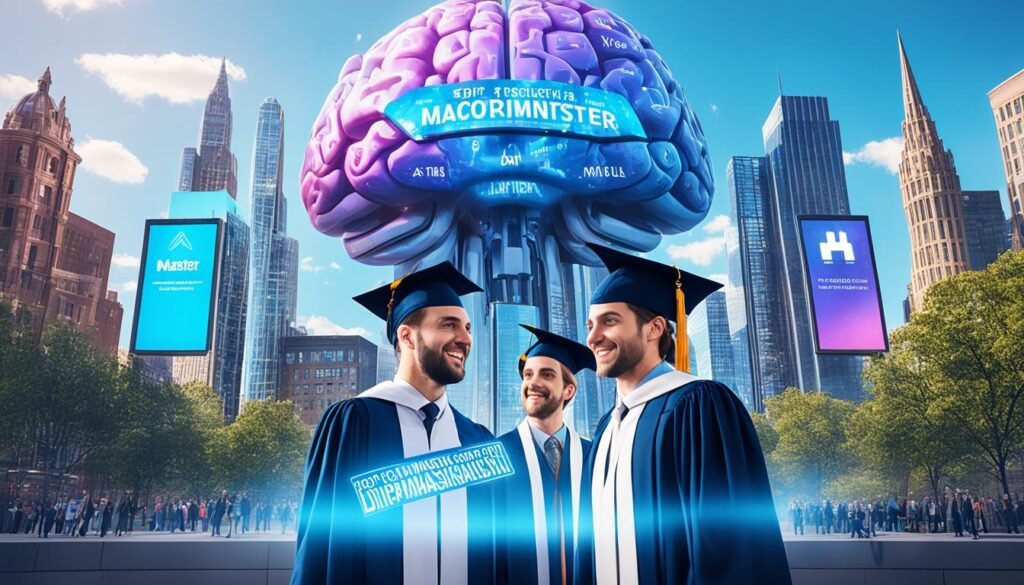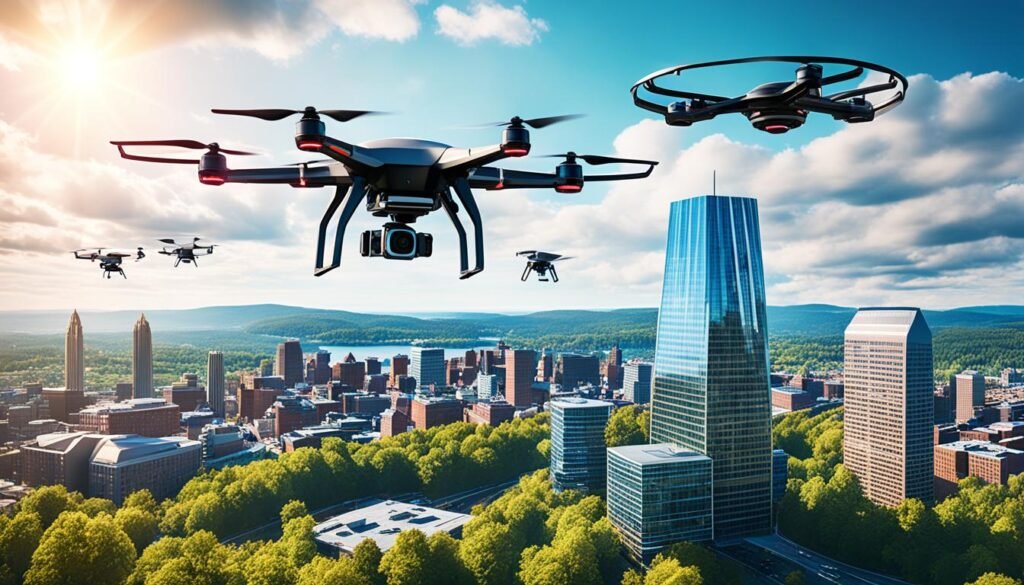Did you know that Boston is quickly becoming a powerhouse for artificial intelligence (AI) education? With multiple universities offering cutting-edge master’s programs in the field, the city is emerging as a hub for AI talent development. From the MS in Robotics & Autonomous Systems at Boston University to the online MS in Robotic Software Engineering at Brandeis University, we’re seeing a surge of innovative AI programs that are preparing students for the rapidly growing AI industry.
Key Takeaways
- Boston is a leading destination for AI master’s education, with multiple top-tier programs available
- Students can choose from a variety of options, including on-campus and online degrees
- These AI programs provide the technical skills, industry connections, and hands-on experience needed to excel in the field
- Graduates of Boston’s AI master’s programs are well-positioned to take advantage of the high demand for AI professionals
- Massachusetts universities are at the forefront of AI research and innovation, further enhancing the value of an AI master’s degree from the region
Artificial Intelligence Education in Massachusetts
Massachusetts has emerged as a leading hub for artificial intelligence (AI) education, offering a diverse range of master’s programs that cater to students’ diverse interests and career aspirations. Among the most popular AI master’s degrees in the state are programs focused on robotics, autonomous systems, and applied machine intelligence.
Popular AI Master’s Programs
One of the state’s most sought-after degrees is the MS in Robotics & Autonomous Systems at Boston University. This program includes a full-time industrial or research internship, providing students with valuable hands-on experience in the field. Northeastern University also stands out with its multiple AI master’s programs, such as the Master of Professional Studies in Applied Machine Intelligence and the MS in Robotics, which incorporate co-op opportunities for students to gain real-world experience.
Innovative Program Features
These AI master’s programs in Massachusetts are known for their industry-focused curricula, emphasizing the practical application of AI technologies. They also offer a range of experiential learning opportunities, including research projects, capstone experiences, and partnerships with local AI companies and organizations. By integrating these unique features, the top AI programs in Boston and across the state aim to equip students with the skills and knowledge needed to thrive in the rapidly evolving AI landscape.
Massachusetts: Artificial intelligence master’s degree Boston Massachusetts
Massachusetts has emerged as a premier destination for students pursuing artificial intelligence (AI) master’s degrees. The state is home to a thriving AI ecosystem, with prestigious universities, cutting-edge research, and a growing number of tech companies investing in the field. From the MS in Robotics & Autonomous Systems at Boston University to the online AI master’s programs at Brandeis University and Worcester Polytechnic Institute, Massachusetts offers a diverse range of high-quality options for aspiring AI professionals.
The AI master’s programs in Massachusetts, particularly in the Boston area, are designed to provide students with the knowledge and skills needed to succeed in this rapidly evolving industry. These programs cover a wide range of topics, from machine learning and deep learning to natural language processing and computer vision, equipping graduates with the technical expertise and practical experience to drive innovation and solve complex problems.

One of the key advantages of pursuing an AI master’s degree in Massachusetts is the state’s robust network of industry partnerships and research collaborations. Students have the opportunity to work on real-world projects, gain hands-on experience, and build connections with leading technology companies and startups. This dynamic ecosystem ensures that AI students in Massachusetts are well-prepared to thrive in the job market upon graduation.
Whether you’re interested in on-campus or online AI master’s programs, Massachusetts offers a diverse range of options that cater to the unique needs and preferences of each student. With its world-class universities, cutting-edge research, and thriving tech industry, the state has become a hub for AI innovation and education, making it an ideal choice for those seeking to advance their careers in this exciting field.
Online Master’s in AI Programs in Massachusetts
Massachusetts is at the forefront of artificial intelligence education, offering not just traditional on-campus programs, but also flexible online AI master’s programs. This provides opportunities for students across the state and beyond to develop advanced skills in AI and robotics, without the need to relocate or sacrifice work or personal commitments.
Brandeis University Online MS in Robotic Software Engineering
One standout online AI program in Massachusetts is Brandeis University’s Online MS in Robotic Software Engineering. This challenging graduate degree prepares students for roles at leading companies like Barclays, Boeing, and Lockheed Martin. The curriculum covers topics such as machine learning, computer vision, and autonomous systems, equipping graduates with the expertise to thrive in the rapidly evolving field of robotics.
WPI Online AI Master’s Degrees
Worcester Polytechnic Institute (WPI) also offers two innovative online AI master’s programs – the MS in Robotics Engineering and the MS in Robotics Engineering – Autonomous Vehicles. These groundbreaking degrees are the first of their kind in the nation, allowing students to earn their AI and robotics credentials from the comfort of their own homes. Through these online AI master’s programs, Massachusetts is making its mark as a hub for remote AI graduate degrees.
Massachusetts’ Growing AI Scene
Massachusetts has emerged as a hub for the artificial intelligence (AI) ecosystem, thanks to the state’s thriving academic institutions and their strong ties to the business community. The AI ecosystem in Massachusetts is continuously expanding, with prestigious universities playing a crucial role in driving innovation and collaboration.
University-Linked Venture Capital Funds
Initiatives like the UMass Amherst Maroon Venture Partners Fund, MIT’s E14 Fund, and Boston College’s SSP Venture Partners have created a symbiotic environment between the education and business sectors. These university-linked venture capital funds have helped attract the interest of major tech giants, such as Amazon, Facebook, Microsoft, and IBM, which have all expanded their AI presence in the state.
Tech Giants Expanding AI Presence
The growing AI ecosystem in Massachusetts has not gone unnoticed by the tech industry. Companies like Amazon, Facebook, Microsoft, and IBM have all established a strong presence in the state, focusing on the development of cutting-edge AI technologies. This influx of tech giants has further solidified Massachusetts’ position as a burgeoning AI hub, attracting talent, investment, and resources to the region.
The combination of university-backed venture capital funds and the expansion of tech companies’ AI presence has created a dynamic and collaborative environment in Massachusetts. This synergy has led to a surge in startup funding, with companies like DataRobot and Kensho raising significant amounts of capital, further cementing the state’s reputation as a leader in the AI ecosystem.

Northeastern University’s AI Master’s Program
Northeastern University’s AI master’s programs stand out for their industry-focused curricula and immersive experiential learning opportunities. The Master of Professional Studies in Applied Machine Intelligence program incorporates a validation process that draws insights from industry professionals, ensuring the Northeastern AI program curriculum aligns with real-world needs.
In addition, Northeastern offers an MS in Robotics, which includes a co-op program where students gain 4-8 months of paid, full-time work experience at leading companies and startups. This hands-on Northeastern AI experience allows students to apply their knowledge and skills in a professional setting, better preparing them for successful careers in the field.
Curriculum Highlights
Northeastern’s AI master’s programs provide a comprehensive education, combining technical coursework in areas like machine learning, computer vision, and natural language processing with business and management modules. This well-rounded Northeastern AI program curriculum equips students with the interdisciplinary knowledge and practical skills needed to excel in the rapidly evolving artificial intelligence industry.
Experiential Learning Opportunities
Beyond the classroom, Northeastern University’s AI master’s students have access to a wealth of experiential learning opportunities. The university’s MBA x Artificial Intelligence program, for instance, combines a technical, AI-focused curriculum with Northeastern’s respected MBA program, giving students a unique chance to develop both technical and leadership capabilities.
Boston University’s MS in Artificial Intelligence
Boston University offers a highly regarded MS in Artificial Intelligence program, which prepares students for leadership roles in the field. The curriculum covers core AI topics, such as machine learning, computer vision, and natural language processing, as well as electives in areas like data science, cryptography, and computer graphics. Students can choose to complete a master’s project or thesis, allowing them to dive deeper into AI research and development under the guidance of faculty members.
Program Requirements
To be admitted into the Boston University AI master’s program, applicants must have a bachelor’s degree in a relevant field, such as computer science, engineering, or mathematics. Strong programming skills and a background in statistics or linear algebra are also required. The BU MS in Artificial Intelligence requirements include submitting transcripts, GRE/GMAT scores, letters of recommendation, and a statement of purpose.

Once enrolled, students must complete a total of 32 credits, including core courses and electives. The program can be completed in as little as one year, with both full-time and part-time options available. Graduates of the Boston University AI master’s program are well-prepared to pursue careers in industries such as technology, finance, healthcare, and more.
Career Outlook for AI Professionals
The demand for AI professionals with advanced degrees is skyrocketing, and the future looks exceptionally bright. According to the World Economic Forum’s Future of Jobs Report 2020, the field of artificial intelligence is expected to create an astounding 97 million new jobs by 2025. Furthermore, Forbes has reported that the hiring of AI specialists has grown a remarkable 74% over the past four years.
The career outlook for AI master’s graduates in Massachusetts is particularly promising. The U.S. Bureau of Labor Statistics has found that artificial intelligence salaries in the United States are over two times higher than the national average salary, highlighting the immense value and demand for these highly skilled professionals. With the state’s thriving AI ecosystem, including major tech companies and innovative startups, the job opportunities for AI professionals Massachusetts are abundant and continue to grow.
High Demand for AI Skills
As organizations across various industries recognize the transformative power of artificial intelligence, the career outlook for AI master’s graduates has never been more promising. Businesses are actively seeking out individuals with advanced AI expertise to drive innovation, enhance decision-making, and gain a competitive edge in the market. This surge in demand has created a highly lucrative and dynamic job market for AI professionals, making it an exceptionally rewarding career path for those with the right skills and education.
AI Research at Massachusetts Universities
Massachusetts is at the forefront of AI research and innovation. The state’s renowned universities, such as the Massachusetts Institute of Technology (MIT), are making significant advancements in cutting-edge fields like robotics. MIT’s Artificial Intelligence Research (AIR) initiative offers graduate students unparalleled opportunities to engage in groundbreaking projects, attend expert speaker series, and contribute to the future of AI.
Beyond MIT, universities across Massachusetts are leveraging their strong ties to the local tech ecosystem, collaborating with industry partners and venture capital funds to drive AI research and development forward. These collaborative efforts are fueling the state’s position as a hub for AI innovation, attracting top talent and resources from around the world.

By fostering a dynamic environment for AI research, Massachusetts universities are shaping the future of this transformative technology. Students and researchers in the state have access to world-class facilities, diverse multidisciplinary perspectives, and a thriving startup culture that encourages the translation of AI breakthroughs into practical applications.
Interdisciplinary Approach to AI Education
Many of the leading interdisciplinary AI education programs in Massachusetts recognize the critical need to equip students with a well-rounded understanding of the field. This goes beyond just technical skills, but also the ability to consider the ethical and societal implications of AI technologies. Programs like Northeastern University’s MBA x Artificial Intelligence and Boston University’s MS in Artificial Intelligence incorporate courses on AI ethics, responsible AI development, and the societal impact of these emerging technologies.
This holistic approach to interdisciplinary AI education in Massachusetts helps prepare students to be leaders in the ethical and responsible implementation of AI. By blending technical expertise with a deep understanding of the ethical considerations, graduates of these programs are poised to drive innovation in the AI space while prioritizing the greater good of society.
Ethical and Responsible AI
A key focus of the interdisciplinary AI education offerings in Massachusetts is on ethical and responsible AI. Students learn about the potential risks and challenges associated with AI, such as algorithmic bias, privacy concerns, and the displacement of jobs. They also explore frameworks and best practices for developing AI systems that are transparent, accountable, and aligned with human values.
This emphasis on ethical AI ensures that students are not only technically proficient, but also equipped to navigate the complex ethical landscape of this rapidly evolving field. By cultivating a deep understanding of the societal implications of AI, graduates of these programs can help shape the responsible development and deployment of these transformative technologies.
Networking and Professional Development
At the heart of Massachusetts’ thriving AI ecosystem are the robust networking and professional development opportunities available to students in the state’s top AI master’s programs. These programs prioritize connecting students with the local AI community, providing them with a wealth of events, workshops, and speaker series to attend.
By engaging with industry experts, attending conferences, and participating in networking activities, AI master’s students in Massachusetts can build valuable professional connections that can open doors to internships, job opportunities, and industry insights. These experiences not only expand students’ knowledge of the latest AI trends and technologies but also help them identify potential career paths and chart their future in this rapidly evolving field.
Boston, in particular, has emerged as a hub for AI professional development, with AI professionals in Boston actively participating in a vibrant community. From tech meetups to industry-specific events, students can immerse themselves in the local AI landscape, building relationships and staying attuned to the pulse of the industry.
By leveraging these networking and professional development opportunities, AI master’s students in Massachusetts can position themselves for success, gaining a competitive edge in the job market and propelling their careers forward in the dynamic field of artificial intelligence.
Admission Requirements for AI Master’s Programs
Applying to top-tier AI master’s programs in Massachusetts can be a detailed process, but understanding the admission requirements can help you navigate it with confidence. Whether you’re interested in AI graduate degrees in Boston or other AI master’s programs across the state, there are several key elements you’ll typically need to submit as part of your application.
Most AI master’s programs in Massachusetts require an online application and fee, along with submitting your unofficial undergraduate transcripts. You’ll also need to prepare a compelling statement of purpose, showcasing your passion for artificial intelligence and outlining your academic and professional goals. A current professional resume is another important component, highlighting your relevant skills and experiences.
Additionally, many programs may request letters of recommendation from academic or professional references who can speak to your qualifications. International applicants may also be required to submit TOEFL or IELTS scores to demonstrate English proficiency. Some AI master’s programs in Massachusetts may consider GRE scores as well, although this is often not a strict requirement.
Regardless of the specific admission criteria, a strong academic record, typically a minimum 3.0 GPA, is often a key factor in the selection process. By thoroughly reviewing the requirements for AI master’s programs Massachusetts and the application process for AI graduate degrees Boston, you can position yourself for success in your pursuit of advanced artificial intelligence education.
Conclusion
Massachusetts has firmly established itself as a leading destination for students seeking master’s degrees in artificial intelligence. With a thriving AI ecosystem, driven by prestigious universities, cutting-edge research, and a growing presence of tech giants, the state offers a diverse range of high-quality program options. From the MS in Robotics & Autonomous Systems at Boston University to the online AI master’s degrees at Brandeis and WPI, Massachusetts provides students with the technical skills, industry connections, and hands-on experiences needed to excel in the rapidly evolving field of artificial intelligence.
As the demand for AI professionals continues to soar, Massachusetts’ AI master’s programs are well-positioned to prepare the next generation of leaders and innovators in this transformative technology. Whether you are looking to advance your career or embark on a new path, the top AI graduate degrees in Boston and across the state offer a pathway to success in this dynamic and rapidly growing field.
Ultimately, Massachusetts’ leadership in AI education and research underscores its commitment to driving innovation and shaping the future of this cutting-edge technology. As we move forward, we can expect the state to continue playing a vital role in cultivating the next generation of AI experts and pioneers.
Source Links
- https://graduate.northeastern.edu/program/master-of-science-in-artificial-intelligence-17839/
- https://www.mastersinai.org/degrees/massachusetts/
- https://www.bu.edu/cs/masters/program/ai/


